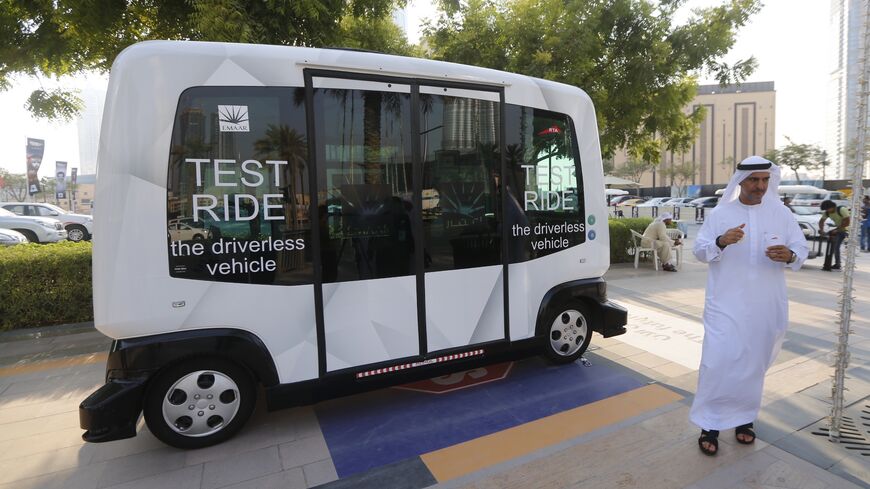DUBAI — The United Arab Emirates on Monday issued Chinese self-driving company WeRide the first national license to test autonomous vehicles in the country.
The permit will allow the Guangzhou-based driving technology company to test its level 4 human-free and fully autonomous vehicles on public roads throughout the emirates.
What happened: The UAE on Monday announced at a high-level Cabinet meeting in the UAE capital that China’s WeRide would acquire the country’s first national license to operate autonomous vehicles.
Sheikh Mohammed bin Rashid al-Maktoum, the UAE prime minister and ruler of Dubai, chaired the Abu Dhabi meeting and made the announcement.
“We also adopted the first national preliminary approval for autonomous vehicle(s) in the UAE for (the) WeRide company. The company will begin testing all types of autonomous vehicles in the country, reflecting a change in the country's future mobility patterns,” said the sheikh, according to a press statement from the Dubai government.
In addition, the ministerial gathering saw the UAE announce the approval by its first Ministry of Investment of a hydrogen energy strategy and agree on new guidelines to expand its electric vehicle market.
The National Electric Vehicles Policy approved at the meeting carries the goal of building a national network of electric vehicle chargers, creating an organized market of electric vehicles, and promoting industries to lower emissions and energy consumption.
Background: WeRide had a presence in the UAE and the greater Middle East even before receiving the license to test their autonomous vehicles.
The company’s Robotaxi had completed public testing on roads in the country for more than a year, according to WeRide.
The self-driving vehicle company and Abu Dhabi open data platform Bayanat partnered to provide free autonomous car services during the Eid al-Adha holidays starting late last June with their model vehicle named TXAI.
WeRide showcased #Robotaxi and #MiniRobobus on the 2023 China Industrial Products Exhibition in the China-UAE Industrial Capacity Cooperation Demonstration Zone in Kizad. Come to take a ride if you are around!#autonomousdriving pic.twitter.com/MY2DznybY4
— WeRide.ai (@WeRide_ai) March 9, 2023
WeRide officially established its presence in the China-UAE Industrial Capacity Cooperation Demonstration Zone last March. The shared goal is to accelerate the commercialization of autonomous driving in the UAE.
WeRide said in a press statement that it is actively seeking to expand globally, with “the Middle East being one of its key focus areas,” including Saudi Arabia. The autonomous car company unveiled its first dynamic robobus route in Saudi Arabia in September of last year at the 2022 Global Artificial Intelligence Summit held in Riyadh.
Why it matters: The UAE agreement with China’s WeRide is helping to drive Dubai’s Autonomous Transportation Strategy for which legislation was introduced in April 2016, reported Reuters at the time.
The initiative’s goal is to make 25% of all transportation in the emirate autonomous by 2030.
دبي ستكون الأولى خارج أمريكا في تشغيل مركبات كروز للتنقل الذاتي تحقيقاً لرؤية صاحب السمو الشيخ محمد بن راشد أن تكون دبي دائما في المركز الأول والمدينة الأفضل للعيش والعمل ..هدفنا تحويل 25% من إجمالي رحلات التنقّل في دبي إلى رحلات ذاتية القيادة عبر مختلف وسائل المواصلات بحلول 2030 pic.twitter.com/RDdpp26k6W
— Hamdan bin Mohammed (@HamdanMohammed) April 12, 2021
The strategy is expected to bring in nearly $6 billion annually through several sectors by reducing transportation costs and carbon emissions, in addition to the number of accidents and “hundreds and millions of hours” lost with traditional transportation, according to the UAE government.
In 2021, Dubai signed an agreement with the United States' General Motors to operate its autonomous vehicles in the emirate starting in 2023. Its goal is to establish a fleet of 4,000 self-driving vehicles by 2030, according to a tweet by the sheikh at the time. He said that Dubai would be the first location outside the United States to operate autonomous vehicles.


f0eb.jpg)





